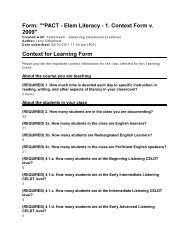The Tutoring Book - California State University, Sacramento
The Tutoring Book - California State University, Sacramento
The Tutoring Book - California State University, Sacramento
Create successful ePaper yourself
Turn your PDF publications into a flip-book with our unique Google optimized e-Paper software.
At this point, you may very well be wondering what any of this has to do with you, a future tutor of<br />
writing. After all, while in 1974 such statements as those professed in the Students’ Right to <strong>The</strong>ir Own<br />
Language were fairly radical, three decades have passed since then. Higher education is no longer what it<br />
once was, and the face of the university, so to speak, is changing. <strong>The</strong>re are now students of many<br />
different races, ethnicities, cultures, ages, and socio-economic classes attending college; this is especially<br />
true of a university like CSUS 2 , where one has only to look around the campus to appreciate the changes<br />
which have occurred in the span of thirty years.<br />
<strong>The</strong> language of the academy, however, is progressing at a slower pace. While students who attend<br />
the university are diverse, the academic discourse they are expected to master is static and allows for very<br />
little variation. Although students are expected to join the academic conversation going on around them,<br />
many of them are not sure how to speak the language. Instead of questioning why they must learn this<br />
new language, most students (understandably) simply want to know how to do so. For some students<br />
learning the language will be a major adjustment, while others, typically those whose home discourses are<br />
similar to the discourse privileged at the university, will find the adjustment somewhat easier.<br />
Nonetheless, most student-writers, whatever their background, are unsure of what an academic essay<br />
“should” look like, what constitutes evidence and examples in scholarly writing, or if they are “allowed”<br />
to use “I” (this is a very common one, it seems). Often times this is compounded by the fact that the<br />
writer’s first language is not English (everyone in my class worked with at least one ESL student).<br />
<strong>The</strong>refore, one of your tasks as a tutor will be to help writers to become familiar with the kind of writing<br />
that is expected at the university.<br />
So how do we help these writers? After all, you have no control over the kinds of assignments the<br />
students must confront and, unfortunately, you do not have the power to single-handedly change the<br />
university, either. I have to agree with Nancy Grimm’s assertion that postmodern writing center work is<br />
often very sticky. It is a Catch-22, for, on the one hand, you do not want to perpetuate the notion that<br />
standard English is superior to other dialects, but, on the other hand, you will certainly not be helping –<br />
but rather hurting – your writers if you suggest to them that they disregard academic conventions in favor<br />
of the dialect of their choosing. You want your writers to do well in their classes so that they can move<br />
on and accomplish whatever goals they have come to college to achieve (which may have absolutely<br />
nothing to do with passing 1A).<br />
But in order to do well, students’ writing must conform to the standards of academic writing, which<br />
is frustrating for you as a tutor because you realize that the university’s standards are arbitrary and that<br />
linguistically speaking one dialect is not superior to another. Often it seems that how something is said<br />
matters more than what is being said. It is difficult not to become angry or disheartened when your writer<br />
gets a near failing grade because his or her paper contains grammatical “errors.” You have witnessed<br />
firsthand the time and effort that he or she has devoted to the assignment, and it is you to whom the writer<br />
expresses his or her frustration and confusion. We need to realize that because an individual’s language is<br />
inextricably linked to who he or she is, if students feel as though their dialects are not “good enough” for<br />
the university, they are likely to feel badly about themselves – this is neither easy nor inconsequential<br />
work that we are doing.<br />
In the writing center, we have the unique opportunity of helping students learn to feel more<br />
comfortable with the language of the university without feeling as though the different languages and<br />
dialects they speak at home or in their communities are lesser. In all honesty, however, I am not sure how<br />
we are to best accomplish this. I have a suspicion that it is something with which most tutors and teachers<br />
continuously struggle. Nevertheless, in what follows I will at least offer a few suggestions.<br />
122

















